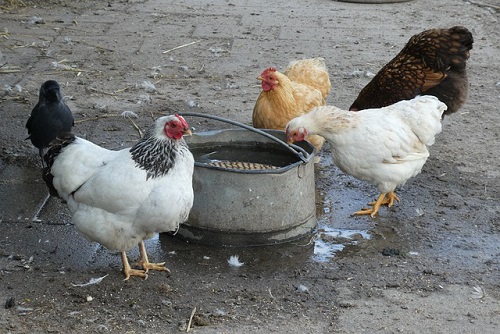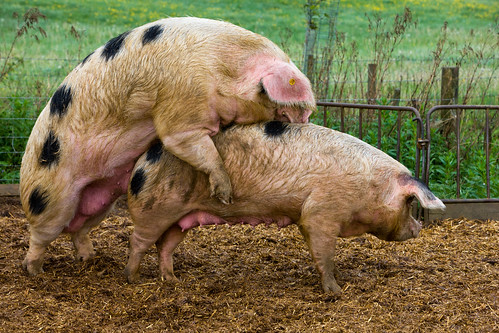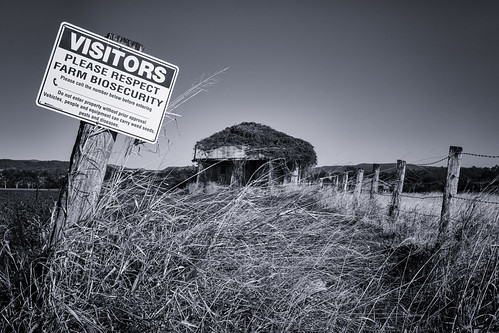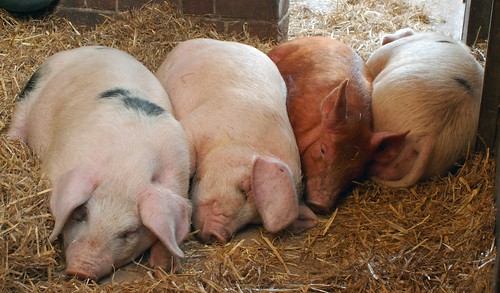Water quality is probably the most of feeding and management of animals that farmers pay the least attention to. In fact, over 90 percent of poultry farmers serve their birds just any water without evaluating its quality. However, it has been found that unsafe or contaminated water is sometimes responsible for some of the health or performance issues in chickens and other farm animals.
Water Treatment or Disinfection in Livestock Farms
In livestock farming, the water given to animals is often gotten directly from the soil (in form of a well or borehole) and then stored in tanks before consumption. Regardless of the origin of the water, it must be treated to ensure that it is safe or uncontaminated at the drinking level to help achieve the highest performance or profitability by the animals.
Water is disinfected or treated basically to remove pathogenic microbes present in it. These microbes are capable of causing infections and diseases. Several diseases are transmitted via drinking water from external supplies, fountains, wells, boreholes or public water supply networks. Similarly, drinking water gets contaminated within a livestock farm through tanks, pipes and drinkers.
Water treatment or disinfection is highly necessary as one of the procedures to get safe drinking water for animal use within livestock production facilities. This is to reduce the chances of infections and diseases. Fortunately, biocides are available to do justice to harmful contaminants and micro-organisms in the water meant to be served to man and animals.
Also Read: The Importance of Water to Livestock Animals
What are Biocides?
Biocides are synthetic or naturally occurring chemical substances or microorganisms that are intended to destroy, counteract, neutralize, prevent the action of, or otherwise exercise control over, any organism considered harmful to man and animals. Some examples of biocides are:
- Anhydrous sodium dichloroisocyanurate
- Calcium hypochlorite
- Chlorine
- Chlorine dioxide
- Hydrogen peroxide
- Potassium peroxymonosulfate
- Sodium dichloroisocyanurate
- Sodium hypochlorite
- Sulfur dioxide
- Trichloroisocyanuric acid
Also Read: Water Consumption Rates/Levels for Layers & Broilers
ISOCHLOR – What it is and used for
ISOCHLOR is one of the globally accepted and approved biocidal products (water treatment chemicals) for poultry farms and homes to prevent water-borne diseases. The active substance in ISOCHLOR is Sodium dichloroisocyanurate (NaDCC). It is usually in tablets and highly recommended for treating drinking water as it exhibits strong biocidal activity even in hard water and water that contains organic matter.
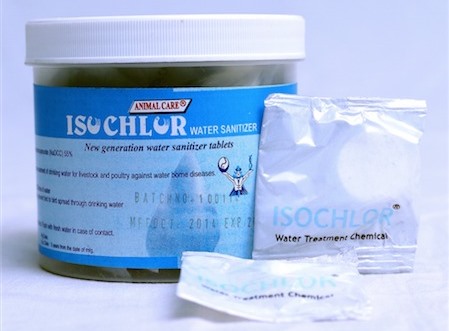
Isochlor is used for the following purposes.
- It is used to treat water and make the water safe for human or animal use
- It is used in the disinfection of water lines
- It is also used in removing biofilms in water pipes/lines and nipple drinkers
- It also prevents the formation of water slime on contact surfaces of water
Where to get ISOCHLOR
You can buy ISOCHLOR in any vet drug store on place order here.
Other similar products are:
- Aquaclean (This is in liquid form)
- Polidine (This Polidine is in liquid form. Apart from being used for water sanitation, it is also used for the treatment of most viral diseases. Polidine is also used as a disinfectant.
- Intra Hydrocare
Remember that many of the problems and yield declines on poultry farms can be caused by poor water quality. Hence the importance of carrying out routine and periodic controls such as water treatment.
